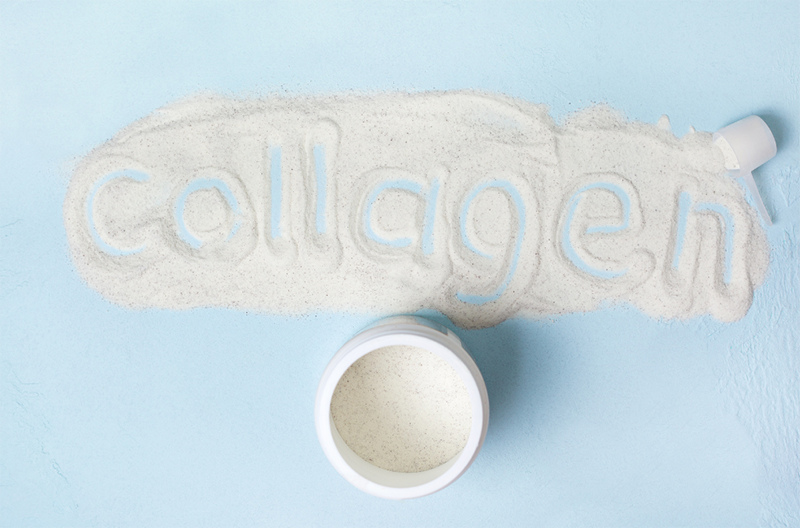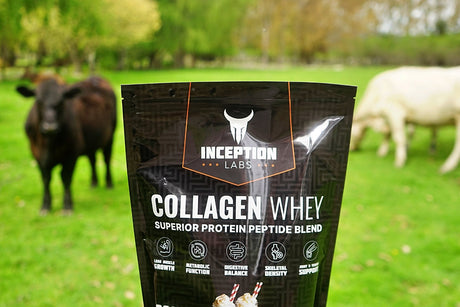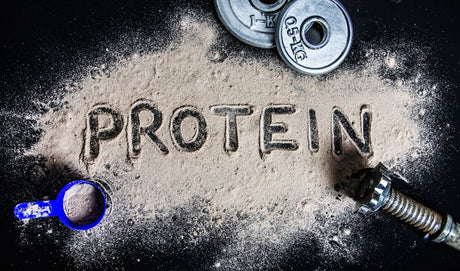Over the past few years, there has been a notable surge in the popularity of collagen peptide supplements, driven by the multitude of health advantages attributed to them. These purported benefits include a wide range, from treating conditions like leaky gut to enhancing skin and joint health. This article aims to delve into the scientific evidence supporting these claims about collagen and distinguish the facts from the hype.
The Role and Structure of Collagen Protein
Collagen protein plays a pivotal role as a fundamental building block of connective tissues within the body, such as skin, tendons, ligaments, and cartilage. It is also found in other areas of the body including blood vessels, eyes, and the gut. Being the most plentiful protein in the human body, collagen constitutes approximately 25% to 35% of the total protein content.
What sets collagen protein apart from other proteins is its unique structural composition. It is comprised of three lengthy amino acid chains, known as alpha chains, which consist of repetitive sequences of glycine, proline, and hydroxyproline. These chains are intricately intertwined in a triple helix formation. This configuration enables collagen to form fibres that lend support and resilience to the body.
Unique Amino Acid Profile
Collagen protein stands out as a unique source of specific amino acids, owing to its triple helix structure composed of repeating sequences of glycine, proline, and hydroxyproline. This makes it arguably the most optimal dietary source of these particular amino acids. In collagen protein, glycine takes the lead among these, establishing roughly 33% of the total amino acids, while proline and hydroxyproline each contribute approximately 14%.In addition to these three, collagen protein also contains other essential amino acids. Alanine accounts for approximately 7%, while arginine makes up around 6%. It also contains lesser amounts of asparagine, aspartate, cysteine, glutamate, glutamine, histidine, isoleucine, leucine, lysine, methionine, phenylalanine, serine, threonine, tyrosine, and valine. It is widely acknowledged that the biomechanical and biological effects observed after collagen intake are primarily attributed to the most prominent amino acids; glycine, proline, and hydroxyproline.
The Impact of Collagen Peptides on Hair, Skin, and Nails
Recent studies offer persuasive evidence that collagen peptides can have positive effects on hair, skin, and nails. Initial studies have shown that collagen peptides hold the potential to enhance various aspects of skin physiology. One notable discovery is that collagen peptides promote the production of hyaluronic acid within dermal fibroblasts, a crucial component for maintaining skin hydration and elasticity. Furthermore, they also improve the skin barrier function by increasing the water content in the stratum corneum, the outermost layer of the skin.
Additionally, collagen peptides stimulate collagen synthesis at both the mRNA and protein levels, resulting in the formation of more robust collagen fibrils. They also facilitate the growth of skin fibroblasts and initiate fibroblast migration. These results underline the vital role of collagen peptides in preserving skin health and suggest that they may have the potential to mitigate some of the effects of aging on skin physiology (Asserin, Lati, Shioya, & Prawitt, 2015).
Collagen Peptides and Skin Health: A Closer Look
Although clinical data on the effectiveness of collagen peptides in skin health and wound healing is somewhat limited, pre-clinical and rodent studies consistently indicate that collagen offers significant potential for positively impacting both of these processes.
The consumption of collagen protein provides substrates, specifically the amino acid peptide Proline-Hydroxyproline. This peptide seems to directly influence dermal fibroblasts, which are responsible for endogenously producing collagen protein (Tanaka, Koyama, & Nomura, 2009).
When collagen is ingested, whether through collagen protein, collagen peptides, or dietary sources, these proteins are not directly integrated into tissues in the body. Instead, collagen is broken down into individual amino acids, which appear to stimulate the body’s collagen-producing cells. The amino acids found in collagen seem to possess antioxidative properties, potentially helping to prevent oxidative damage in the skin (Sato, Asai, & Jimi, 2020).
Collagen’s Role in Hair and Nail Growth
Studies investigating collagen’s potential to support hair and nail growth have revealed similar results and mechanisms of action as those promoting healthy skin (Glynis, 2012) (Hexsel, et al., 2017). This implies that the advantages of collagen may go beyond skin health, potentially providing a comprehensive effect on the upkeep and improvement of our body’s connective tissues.
| Strengthen nails and improve hair growth with ATP Science Beauty Collagen. |
Collagen and Joint Health
One of the most frequently cited advantages of collagen is its potential influence on joint health, which could be particularly beneficial for individuals dealing with arthritis. A study revealed that undenatured type II collagen, a nutritional component, significantly improved knee function in osteoarthritis subjects by day 180. It was well-tolerated while surpassing the effects of a placebo and glucosamine chondroitin. Additionally, undenatured type II collagen has also demonstrated its ability to protect animals against the onset of joint damage in experimentally induced arthritis models for both osteoarthritis and rheumatoid arthritis (Lugo, Saiyed, & Lane, 2016).
Another study suggested that native collagen, much like dietary proteins, can induce oral tolerance. Native collagen could play a role in modulating the response of the gut immune system, specifically the gut-associated lymphoid tissue, to shift towards a tolerogenic response against collagen. This shift may train the immune system not to recognize collagen joint degradation products as damage-associated molecular patterns, thereby avoiding joint damage produced by immune system activation (de Almagro, 2020).
It’s crucial to highlight that all the research relating to collagen and its impact on joint health has utilized undenatured type II collagen. Type II collagen is exclusively found in joint cartilage. Being undenatured means it has not undergone modification through excessive heating or acidic processes, which many manufacturers use to convert collagen protein into collagen peptides. Therefore, if you’re considering collagen for its benefits to joint health, it’s advised to specifically look for type II collagen.
| Strengthen bones, tendons, ligaments and cartilage with specific hydrolysed collagen peptides from ATP Science J.O.L.T. |
Collagen and Muscle Growth
The capacity of collagen protein to stimulate muscle growth remains a topic of ongoing debate, especially considering the proven efficacy of readily accessible alternatives such as whey protein.
A study that focused on elderly individuals suffering from sarcopenia (age-related muscle loss) explored the effects of collagen peptide supplementation. The researchers concluded that the combination of resistance exercise with collagen peptide supplementation led to a more noticeable improvement in body composition, as evidenced by a significant increase in muscle mass and decrease in fat mass, compared to a placebo. Muscular strength also significantly improved after collagen peptide intake compared with the placebo (Zdzieblik, Oesser, Baumstark, Gollhofer, & Konig, 2015). However, these findings are not unexpected. Given routine training, individuals who supplement any type of protein, whether it’s whey, vegan, or collagen, will see enhanced results.
This study offered intriguing insights into why collagen supplementation could benefit muscle mass. Firstly, the high nitrogen content of collagen was emphasized. Despite collagen’s notoriously low leucine content (leucine is the amino acid that initiates muscle protein synthesis), its high nitrogen content may improve nitrogen balance, thereby potentially preventing muscle protein turnover. This could improve indicators of muscle catabolism and eventually lead to improvements in muscle anabolism.
Secondly, collagen peptides are noticeably abundant in arginine and glycine, two amino acids that are essential for the endogenous production of creatine. Considering creatine’s ergogenic benefits and its role in enhancing muscle mass, collagen peptides may serve as the building blocks for your body to synthesize creatine, resulting in improved muscle mass and overall performance.
Collagen peptides not only improve markers of muscle mass and strength in the elderly population but also appear to benefit young, healthy populations. Studies have shown that after 12 weeks of hypertrophy resistance exercise training combined with collagen supplementation, participants experienced higher body mass and fat-free mass and a slightly more pronounced increase in strength (Oertzen-Hagemann, et al., 2019).
Despite collagen’s relatively low content of branched-chain amino acids, such as leucine, isoleucine, and valine, it still appears to have a stimulatory effect on muscle protein synthesis or, at the very least, a preventative effect on muscle protein catabolism.
| Boost you protein intake with delicious Noway Collagen Protein from ATP Science. |
Collagen and Growth During Adolescence
Besides the ability of collagen peptides to enhance muscle growth in conjunction with exercise, they also seem to have some impact on general growth during adolescence. A study concluded that collagen may play a crucial role in optimal growth and development during various life stages and may positively affect bone remodeling. The results suggested that sustained dietary collagen intake appears to stimulate bone formation during significant periods of growth and development, influencing both bone formation and bone resorption biomarkers (Martin-Bautista, et al., 2011). The reasons for these findings once again relate to the high quantities of the amino acids glycine, proline, and hydroxyproline.
A study investigating the metabolism of proline and hydroxyproline in both human and animal nutrition discovered that these amino acids maintain cell structure and function. There are notable species differences in proline metabolism and requirements among vertebrate animals during the life cycle. However, emerging evidence consistently identifies proline as an important regulator of cell metabolism and physiology. Therefore, proline can be considered a functional amino acid for humans, livestock species, poultry, and fish. These promising effects are expected to translate into enhanced efficiency of nutrient utilization and improved health in organisms (Wu, et al., 2011).
The most prevalent amino acid in collagen, known as glycine, shows evidence that it may directly increase growth hormone levels (Kasai, Kobayashi, & Shimoda, 1978). This suggests that collagen’s unique amino acid profile not only contributes to its structural role but also has potential implications for growth and development.
Collagen and Cognitive Function
Collagen also offers potential benefits for cognitive function. Studies have observed that after daily consumption of collagen over four weeks, there were significant alterations in participants’ brain structure, along with improved cognition. While enhancements in cognitive function can be achieved through various means, such as caffeine, modifications in brain structure are a more profound finding (Koizumi, Inoue, Sugihara, & Igase, 2020).
The mechanism underlying this beneficial effect remains unclear. However, Syouji et al. reported an increase in the expression of brain-derived neurotrophic factor (BDNF) in the hippocampal formation by collagen in vitro and a significant increase in passive avoidance learning. In another study, the oral administration of oyster hydrolytic peptides in mice enhanced their spatial learning and memory capacity, accompanied by the upregulated expression of BDNF and neural cell adhesion molecules (Wang, et al., 2018). These findings in animal models suggest that the ingestion of collagen might contribute to changes in brain structure and improvements in language cognitive function through the upregulation of BDNF expression in the brain.
BDNF is a neuropeptide that has attracted attention from those seeking to optimise nootropic health for its supposed ability to enhance neurogenesis. Collagen protein may improve the expression of this specific protein, which can be seen in animal trials. This is one of the speculated mechanisms of action by which collagen can enhance cognition and brain structure.
In addition, it is also possible that collagen may enhance cognition by improving sleep quality. A few trials looking specifically at glycine, have found that this amino acid is reliable at improving markers of sleep and fatigue, as well as cognition secondarily (Yamadera, et al., 2007).
In conclusion, collagen, the body’s most plentiful protein, plays a vital role in numerous physiological functions. Its distinctive structure and amino acid composition contribute to its diverse health advantages. From enhancing skin health and joint function to promoting muscle growth and cognitive function, collagen seems to have extensive effects on human health. Studies have demonstrated that collagen peptides can improve skin physiology, stimulate bone formation during crucial growth stages, and even induce changes in brain structure. The high content of specific amino acids like glycine, proline, and hydroxyproline lays the groundwork for its remarkable and diverse health advantages.
References
Asserin, J., Lati, E., Shioya, T., & Prawitt, J. (2015, Dec). The effect of oral collagen peptide supplementation on skin moisture and the dermal collagen network: evidence from an ex vivo model and randomized, placebo-controlled clinical trials. J Cosmet Dermatol, 14(4), 291-301. doi:10.1111/jocd.12174
de Almagro, M. C. (2020, March 06). The Use of Collagen Hydrolysates and Native Collagen in Osteoarthritis. American Journal of Biomedical Science & Research, 7(6), 001217. doi:10.34297/AJBSR.2020.07.001217
Glynis, A. (2012, Nov). A Double-blind, Placeno-controlled Study Evaluating the Efficacy of an Oral Supplement in Women With Self-perceived Thinning Hair. J Clin Aesthet Dermatol, 5(11), 28-34. doi:PMID: 23198010
Hexsel, D., Zague, V., Schunck, M., Siega, C., Camozzato, F. O., & Oesser, S. (2017, Dec). Oral supplementation with specific bioactive collagen peptides improves nail growth and reduces symptoms of brittle nails. J Cosmet Dermatol, 16(4), 520-526. doi:10.1111/jocd.12393
Kasai, K., Kobayashi, M., & Shimoda, S. I. (1978, Feb). Stimulatory effect of glycine on human growth hormone secretion. Metabolism, 27(2), 201-8. doi:10.1016/0026-0495(78)90165-8
Koizumi, S., Inoue, N., Sugihara, F., & Igase, M. (2020, Jan). Effects of Collagen Hydrolysates on Human Brain Structure and Cognitive Function: A Pilot Clinical Study. Nutrients, 12(1), 50. doi:10.3390/nu12010050
Lugo, J. P., Saiyed, Z. M., & Lane, N. E. (2016). Efficacy and tolerability of an undenatured type II collagen supplement in modulating knee osteoarthritis symptoms: a multicenter randomized, double-blind, placebo-controlled study. Nutr J, 15, 14. doi:10.1186/s12937-016-0130-8
Martin-Bautista, E., Martin-Matillas, M., Martin-Lagos, J. A., Maranda-Leon, M. T., Munoz-Torres, M., Ruiz-Requena, E., . . . Campoy, C. (2011). A nutritional intervention study with hydrolyzed collagen in pre-pubertal Spanish children: influence on bone modeling biomarkers. J Pediatr Endocr Met, 24(3-4), 147-153. doi:10.1515/JPEM.2011.009
Oertzen-Hagemann, V., Kirmse, M., Eggers, B., Pfeiffer, K., Marcus, K., de Marees, M., & Platen, P. (2019, May). Effects of 12 Weeks of Hypertrophy Resistance Exercise Training Combined with Collagen Peptide Supplementation on the Skeletal Muscle Proteome in Recreationally Active Men. Nutrients, 11(5), 1072. doi:10.3390/nu11051072
Sato, K., Asai, T. T., & Jimi, S. (2020). Collagen-Derived Di-Peptide, Prolylhydroxyproline (Pro-Hyp): A new Low Molecular Weight Growth-Initiating Factor for Specific Fibroblasts Associated With Wound Healing. Front Cell Dev Biol., 8, 548975. doi:10.3389/fcell.2020.548975
Syouji, S., Mizushige, T., & Kabuyama, Y. (2017). Effects of collagen hydrolysate on proliferation of neural stem cells and expression of neurotrophic factor in hippocampus. Amino Acid Sci, 11, 100.
Tanaka, M., Koyama, Y.-i., & Nomura, Y. (2009, April 7). Effects of Collagen Peptide Ingestion on UV-B-Induced Skin Damage. Biosci. Biotechnol. Biochem., 73(4), 930-932. doi:10.1271/bbb.80649
Wang, X., Yu, H., Xing, R., Liu, S., Chen, X., & Li, P. (2018). Effect and mechanism of oyster hydrolytic peptides on spatial learning and memory in mice. RSC Advances, 8(11), 6125-6135. doi:10.1039/c7ra13139a
Wu, G., Bazer, F. W., Burghardt, R. C., Johnson, G. A., Kim, W. S., Knabe, D. A., . . . Spencer, T. E. (2011, Apr). Proline and hydroxyproline metabolism: implications for animal and human nutrition. Amino Acids, 40(4), 1053-1063. doi:10.1007/s00726-010-0715-z
Yamadera, W., Inagawa, K., Chiba, S., Bannai, M., Takahasi, M., & Nakayama, K. (2007, April). Glycine ingestion improves subjective sleep quality in human volunteers, correlating with polysomnographic changes. Sleep and Biological Rhythms, 5(2), 126-131. doi:10.1111/j.1479-8425.2007.00262.x
Zdzieblik, D., Oesser, S., Baumstark, M., Gollhofer, A., & Konig, D. (2015, Oct 28). Collagen peptide supplementation in combination with resistance training improves body composition and increases muscle strength in elderly sarcopenic men: a randomised controlled trial. Br J Nutr, 114(8), 1237-1245. doi:10.1017/S0007114515002810













